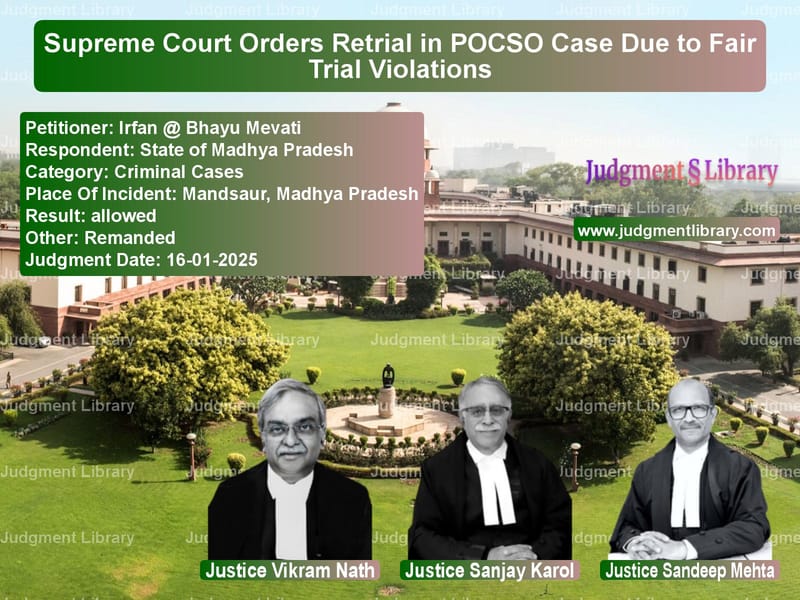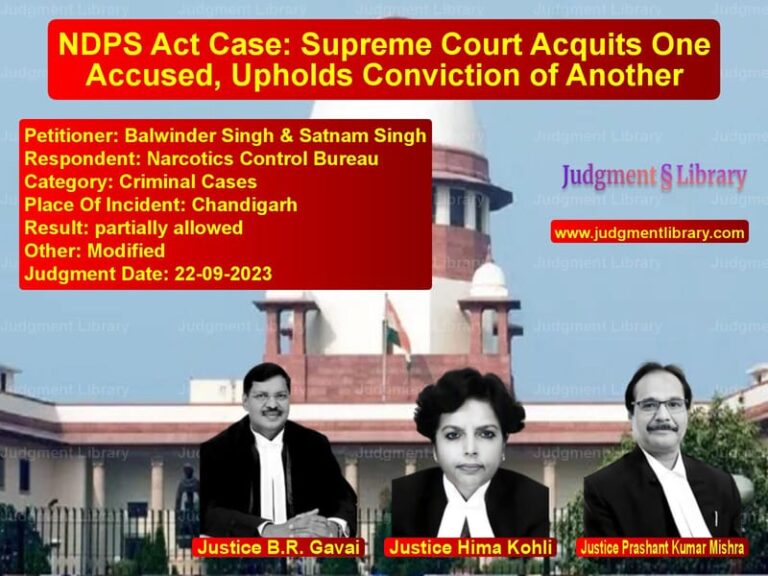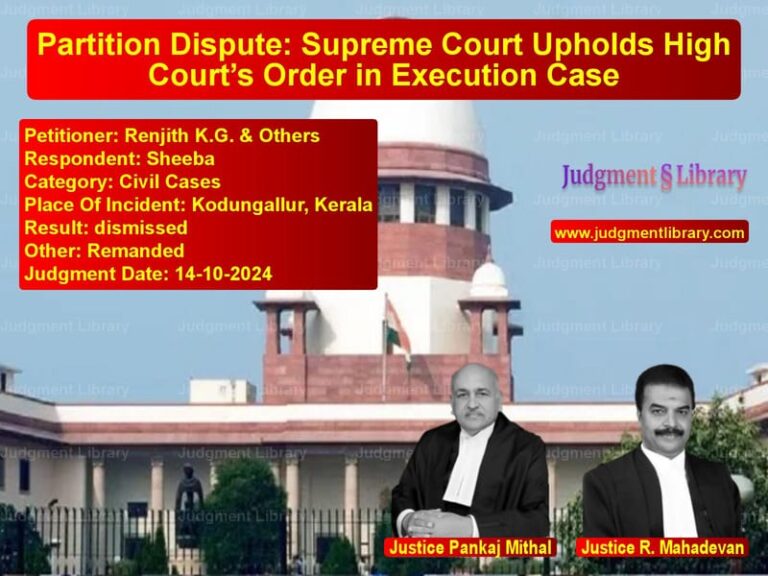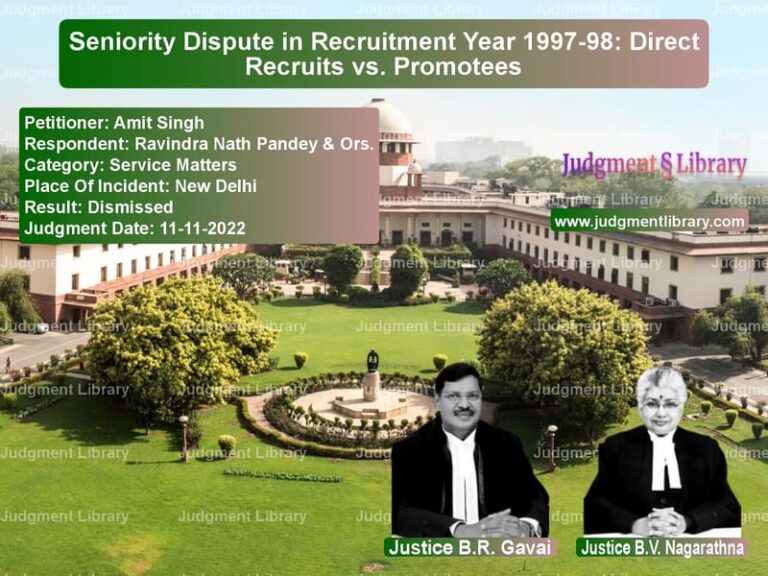Supreme Court Orders Retrial in POCSO Case Due to Fair Trial Violations
The Supreme Court of India has ordered a retrial in the case of Irfan @ Bhayu Mevati v. State of Madhya Pradesh, overturning the death penalty imposed on the appellant for sexual assault and attempted murder of a minor. The Court ruled that the trial was conducted in undue haste, denying the accused a fair opportunity to defend himself, especially regarding the DNA evidence that formed the backbone of the prosecution’s case.
Background of the Case
The case originated on June 26, 2018, when a minor girl from Mandsaur, Madhya Pradesh, was reported missing after school. The next day, she was found in a critical condition, with severe injuries and signs of sexual assault. Following an investigation, the police arrested two accused, Irfan @ Bhayu Mevati and Asif Mevati, based on CCTV footage and witness identification. The accused were charged under multiple sections of the IPC and the Protection of Children from Sexual Offences (POCSO) Act.
Key Legal Issues
- Whether the trial was conducted in violation of the accused’s right to a fair trial.
- Whether DNA evidence was improperly admitted without due process.
- Whether the accused was denied an opportunity to examine expert witnesses.
- Whether the High Court erred in confirming the death penalty.
Trial Court and High Court Decisions
The Special POCSO Court in Mandsaur convicted the accused and sentenced them to death on August 21, 2018. The Madhya Pradesh High Court upheld the conviction and confirmed the death sentence on September 9, 2021. The accused then appealed to the Supreme Court.
Arguments by the Appellants
- The appellants argued that the trial was conducted within two months, denying them sufficient time to prepare their defense.
- They contended that the DNA report was not properly examined, and they were not given a chance to cross-examine the forensic experts.
- They claimed that key forensic evidence, including chain of custody records and electropherograms, was not provided to them.
- The defense pointed out inconsistencies in the prosecution’s case, including conflicting medical reports.
Arguments by the Respondents (State of Madhya Pradesh)
- The State argued that the DNA evidence was conclusive and was admitted under Section 293 CrPC without requiring expert testimony.
- They contended that the trial was conducted expeditiously as per the mandate of the Criminal Law Amendment Act, 2018, which requires swift resolution of POCSO cases.
- The prosecution maintained that the evidence, including witness testimonies and forensic reports, was sufficient to establish guilt beyond a reasonable doubt.
Supreme Court’s Observations
- “The DNA profiling report is a document on which the entire fulcrum of the prosecution case is based. The failure to examine the scientific experts and provide complete documentation has created a grave doubt on the probative value of the report.”
- “The trial was concluded within two months, which, while in line with legal mandates for expeditious trials, must not compromise the fundamental principles of a fair trial.”
- “The accused was not provided an opportunity to cross-examine the forensic experts, which constitutes a serious violation of due process.”
- “In capital punishment cases, the highest degree of scrutiny is required. The accused must be afforded every opportunity to defend himself, especially when DNA evidence is relied upon so heavily.”
Final Judgment
- The Supreme Court set aside the death sentence and ordered a retrial.
- The trial court was directed to summon forensic experts associated with the DNA report and allow cross-examination.
- The accused was granted a fresh opportunity to present their defense, including the right to challenge forensic evidence.
- The retrial must be completed within four months.
Conclusion
This ruling reinforces the importance of fair trial rights, particularly in cases where capital punishment is involved. The Supreme Court has ensured that due process is followed, preventing hasty convictions that could lead to a miscarriage of justice.
Petitioner Name: Irfan @ Bhayu Mevati.Respondent Name: State of Madhya Pradesh.Judgment By: Justice Vikram Nath, Justice Sanjay Karol, Justice Sandeep Mehta.Place Of Incident: Mandsaur, Madhya Pradesh.Judgment Date: 16-01-2025.
Don’t miss out on the full details! Download the complete judgment in PDF format below and gain valuable insights instantly!
Download Judgment: irfan-@-bhayu-mevati-vs-state-of-madhya-prad-supreme-court-of-india-judgment-dated-16-01-2025.pdf
Directly Download Judgment: Directly download this Judgment
See all petitions in Bail and Anticipatory Bail
See all petitions in Custodial Deaths and Police Misconduct
See all petitions in Judgment by Vikram Nath
See all petitions in Judgment by Sanjay Karol
See all petitions in Judgment by Sandeep Mehta
See all petitions in allowed
See all petitions in Remanded
See all petitions in supreme court of India judgments January 2025
See all petitions in 2025 judgments
See all posts in Criminal Cases Category
See all allowed petitions in Criminal Cases Category
See all Dismissed petitions in Criminal Cases Category
See all partially allowed petitions in Criminal Cases Category







